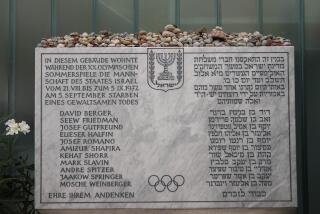Germanys Reach Monetary Accord : Europe: Economic experts from both countries will tackle the currency problem. But any formula will await March elections in the East.
- Share via
BONN — East and West German leaders agreed Tuesday to take steps toward monetary union and, eventually, reunification.
Chancellor Helmut Kohl of West Germany told reporters after meeting with East German Prime Minister Hans Modrow that a joint group of economic experts will meet next week to begin the process. They will try to devise a way to make the West German currency, the deutschemark, the common currency in the two countries.
But any formula that the group comes up with, Kohl said, will have to be put on hold until after the East German elections scheduled for March 18.
Political sources in Bonn said the task of working out a joint monetary arrangement will be a difficult one because any further devaluation of the East German mark, the ostmark, could wipe out people’s savings unless there is some provision for compensation.
There was general agreement among German experts here that once East Germany permits West German finance officials to determine economic policy, the way to unification will be cleared.
Kohl said: “We Germans now have the historic chance to realize the unity of our fatherland in free self-determination. Unity is finally possible. We are offering our strongest economic asset, the deutschemark, one of the world’s strongest, most stable and generally acceptable currencies.”
Modrow, who appeared to be discomfited by what some officials felt was a patronizing attitude on Kohl’s part, replied, “Unity is drawing nearer.”
The two leaders agreed to take up further details of the unification process but only after bringing in the four World War Allied powers--the United States, Britain, France and the Soviet Union.
In Ottawa, meanwhile, at a meeting of East-West foreign ministers, Britain’s Foreign Secretary Douglas Hurd said the wartime Allies are close to agreement on a formula for German unification. He referred to a U.S. plan for the two Germanys to discuss the procedure immediately after the March elections in East Germany, with the Allies then conferring on security measures.
Under the U.S. plan, a unified Germany would take West Germany’s place in the North Atlantic Treaty Organization. Soviet official have said they would prefer a neutral Germany.
West German officials said that Kohl, in his talks with Modrow, again rejected the concept of a neutral Germany and said that “the future” will decide the nature of the new country’s security arrangements.
Modrow, who joined Kohl in meeting with the press after Tuesday’s conference, said that East Germany could not simply be taken over by West Germany.
“There can be no thought of a sellout,” he said. “Social legislation cannot be seen from just one point of view.”
Trying to discount reports in the West German press that East Germany is on the verge of bankruptcy, Modrow said his people are creative and hard-working and have industries and farmland that can attract foreign investment.
Also, he said, his country has developed strong moral values in the 40 years since it was created.
“This is a very hopeful basis,” he said. “Nobody should go into a future Germany in fear.”
Kohl reminded Modrow that about 85,000 East Germans have sought a new life in West Germany this year, putting a heavy burden on East Germany’s economy and on West Germany’s social services.
“We still have a difficult stretch of road ahead of us before fulfillment of German unity,” he said.
On Monday, the East German Cabinet had agreed to ask the Kohl government for $9 billion in interim aid, pending elections and reorganization of the East German government. But Theo Waigel, the West German finance minister, said Tuesday that no such massive loans could be advanced while so little is known of East German finances.
Modrow was to meet with a number of other West German leaders before returning to East Berlin today.
More to Read
Sign up for Essential California
The most important California stories and recommendations in your inbox every morning.
You may occasionally receive promotional content from the Los Angeles Times.













